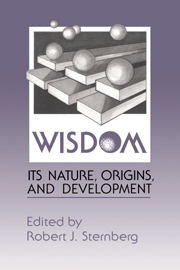Book contents
- Frontmatter
- Contents
- List of contributors
- Preface
- Part I Approaches to the study of wisdom
- Part II Approaches informed by philosophical conceptions of wisdom
- 2 Wisdom through the ages
- 3 The psychology of wisdom: an evolutionary interpretation
- 4 Wisdom as integrated thought: historical and developmental perspectives
- Part III Approaches informed by folk conceptions of wisdom
- Part IV Approaches informed by psychodevelopmental conceptions of wisdom
- Part V Integration of approaches and viewpoints
- Name index
- Subject index
3 - The psychology of wisdom: an evolutionary interpretation
Published online by Cambridge University Press: 05 June 2012
- Frontmatter
- Contents
- List of contributors
- Preface
- Part I Approaches to the study of wisdom
- Part II Approaches informed by philosophical conceptions of wisdom
- 2 Wisdom through the ages
- 3 The psychology of wisdom: an evolutionary interpretation
- 4 Wisdom as integrated thought: historical and developmental perspectives
- Part III Approaches informed by folk conceptions of wisdom
- Part IV Approaches informed by psychodevelopmental conceptions of wisdom
- Part V Integration of approaches and viewpoints
- Name index
- Subject index
Summary
In the attempt to illuminate what wisdom is about, we shall adopt a method that, for lack of a better term, we might call “evolutionary hermeneutics.“ This method is based on the assumption that concepts relating to the evaluation of human behavior – such as virtue, courage, freedom, or wisdom – and that have been used for many centuries under very different social and historical conditions are likely to have adaptive value for humankind. The method is based on the further assumption that to understand the significance of such concepts, it is advantageous to compare their meanings across time, in order to identify invariant components as well as possible variations in response to differing conditions in the surrounding cultural environment.
To find out what we mean by wisdom at the end of the 20th century is important, but it is not sufficient. No matter how advanced we think we are in terms of understanding the human psyche compared to former times, we still only have access to a limited cross section of the growing branch of knowledge. To ignore the hard-won insights of the past about issues that are vital for survival is like blinding ourselves on purpose out of false pride.
A simple example may help illustrate this point. Up to a few generations ago, children in our culture were warned against promiscuous sexuality, especially of a homosexual kind.
- Type
- Chapter
- Information
- WisdomIts Nature, Origins, and Development, pp. 25 - 51Publisher: Cambridge University PressPrint publication year: 1990
- 88
- Cited by



